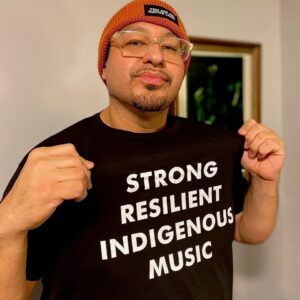Curtis ClearSky has been named Executive Director of the new Indigenous Music Office (IMO), an advocacy group aimed at growing and enhancing the Indigenous music industry in Canada. The Vancouver-based artist is of Anishinaabe and Nitstiapii heritage, and is a veteran musician with his “Indigifunk” band, Curtis ClearSky and the Constellationz. ClearSky has been a longtime activist, promoting Indigenous music and acting on issues (food sovereignty, youth advocacy, professional development), including leadership in the Indigenous Music Circle of British Columbia. He’ll head up an Advisory Board that includes Nicole Auger, Leela Gilday, Alan Greyeyes, Shoshona Kish and Amanda Rheaume.
It’s early days yet, but ClearSky says, “We’re in the process of organizing a structure to connect with our community. We’re sorting it out… One of the great things that we’re going to be providing is a directory on the website, which [will be] the essential hub space for Indigenous artists, authors, writers, [and the] Indigenous-owned music industry. [They’ll] be able to provide their information as an access point, as well as a space that networks the non-Indigenous music industry to our Indigenous-owned music industry. It’s an opportunity space to network and engage.” The website, currently in development at press time, is expected to launch in 2024.
ClearSky points to the 2011 study Understanding Aboriginal Arts in Canada Today, completed for the Canada Council for the Arts, by France Trépanier and Chris Creighton-Kelly. “It identifies that the Indigenous population is the fastest-growing population in the country,” he says. “Our presence is already flourishing. We’re growing so fast – the music community, the artists within the community.”
 ClearSky says the IMO will advocate for the Indigenous music community with governments, including at the federal level. “Some of our colleagues recently spoke at a CRTC hearing advocating for inclusivity, equity, and equality, for the Indigenous-owned music industry to fully participate,” he says. “In addition to providing general support for the community, there’s additional advocacy work on many levels.” That group asked the CRTC to consider a five percent Indigenous music content quota, similar to the Canadian Content rules established in 1971 to bolster the nation’s music industry.
ClearSky says the IMO will advocate for the Indigenous music community with governments, including at the federal level. “Some of our colleagues recently spoke at a CRTC hearing advocating for inclusivity, equity, and equality, for the Indigenous-owned music industry to fully participate,” he says. “In addition to providing general support for the community, there’s additional advocacy work on many levels.” That group asked the CRTC to consider a five percent Indigenous music content quota, similar to the Canadian Content rules established in 1971 to bolster the nation’s music industry.
The Indigenous Music Office is the kind of organization that ClearSky wishes he’d had access to earlier in his career. “For my generation, older generations, past generations?” he asks, rhetorically. “Many of us could have absolutely benefited from having resources more accessible, more available for us, to assist us in all our social developments, our music career developments. That’s exactly why we’re here now. Some of us recognized those gaps, and recognized where those challenges have been. That’s one of the many services we’re wishing to provide. Access to resources, access to information, access to networking/connecting.”
ClearSky is obviously motivated by the notion that Indigenous music should be widely heard. “Everywhere and anywhere,” he says. “We belong. This is our continent; this is our country. Our voices belong everywhere. It’s a time where we’re recognizing the impact of violence on Indigenous people in this country. At residential schools children have been murdered, beaten violently for uttering our beautiful languages. That’s a genocidal crime. We’re here to bring justice, to normalize Indigenous narrative, Indigenous story, our songs – traditional or contemporary. We’re normalizing our presence. We’re in celebration here of our existence, and ensuring that our songs and stories continue, and are part of the landscape, and are part of society moving forward.”
It hasn’t been determined yet whether the IMO will be directly involved in providing funding for artists. “In terms of funding,” ClearSky says, “ we’re having a strategic planning session and working to further develop some short- and long-term goals. Of course, the goal is to have our communities thriving within the industry… That’s a collective discussion we’re putting together with our advisory board. Our short-term goal absolutely is going to be supporting the Indigenous-owned music industry, connecting with existing sources of funding, and providing access to that information for those who may not be aware.”
Although a specific date for the Office’s launch has yet to be announced, ClearSky says that he and the IMO can be contacted at info@IndigenousMusicOffice.com for any input or inquiries. “We’re open to connecting with our allies,” he says. “We’re looking to connect with our partners who are open to justice for Indigenous peoples, those that are open to creating equality, and ensuring that [the process of] diversity is taking place, and that Indigenous people are part of that diversity.”